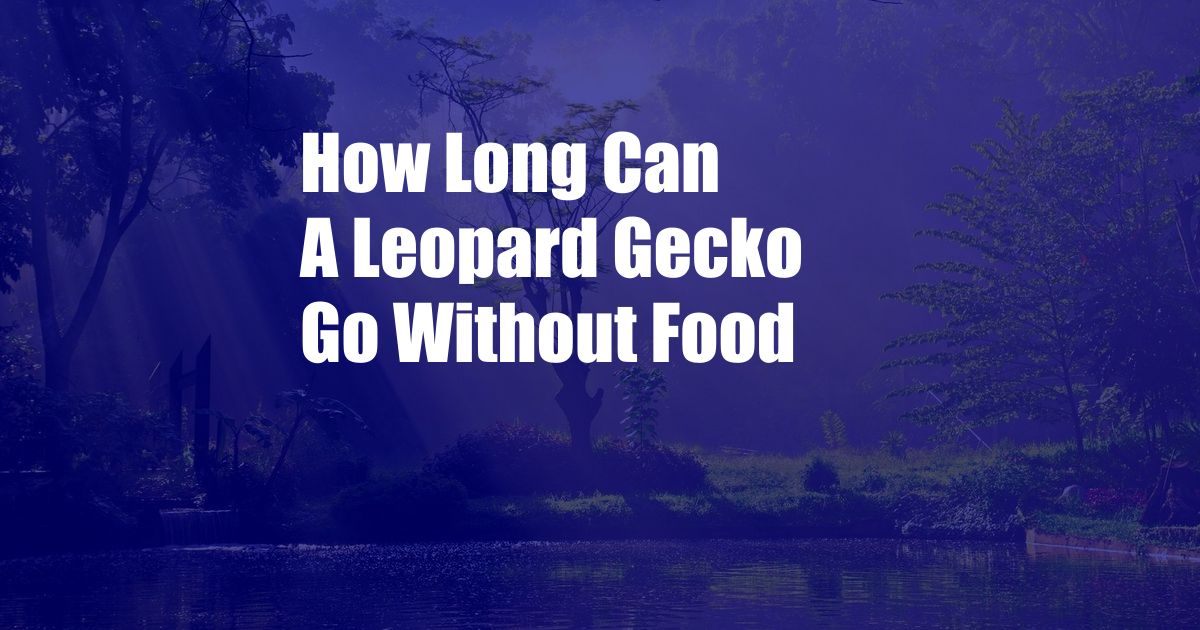
How Long Can a Leopard Gecko Go Without Food?
In the sweltering heat of the African desert, I stumbled upon a remarkable sight. A lone leopard gecko, its sleek body covered in intricate patterns, lay motionless beneath the shade of a rock. Its eyes were closed, and its breathing was shallow and slow. I couldn’t help but wonder how long this creature could survive without sustenance in this unforgiving environment.
The leopard gecko (Eublepharis macularius), a resilient reptile native to the arid regions of Africa and Asia, has evolved unique adaptations to endure harsh conditions. Among these adaptations is their exceptional ability to withstand extended periods of fasting.
Surviving on Stored Energy: Metabolic Adaptations
Leopard geckos possess a remarkable ability to store energy in the form of fat and glycogen, which provide them with reserves to draw upon when food is scarce. During times of fasting, they enter a semi-dormant state, slowing their metabolism and reducing their energy expenditure. Their bodies also produce ketones, which are secondary metabolites that can be used as an alternative fuel source.
The liver plays a crucial role in this metabolic adaptation. When food is abundant, the liver converts excess glucose into glycogen, storing it for later use. During fasting, the liver breaks down glycogen into glucose, releasing it into the bloodstream to maintain energy levels. Additionally, the liver produces ketones from fatty acids, providing an alternative source of fuel for the brain and other organs.
Tail Autotomy: A Sacrificial Defense
In extreme cases, leopard geckos may resort to tail autotomy, a self-defense mechanism that involves voluntarily shedding a portion of their tail. The tail contains a large proportion of fat reserves, which can provide nourishment in the absence of other food sources. This sacrifice allows the gecko to escape predators or other threats and can also distract the attacker while the gecko makes its escape.
The tail of the leopard gecko is highly regenerative, and it will typically grow back over time. However, the regenerated tail may not have the same length or pigmentation as the original.
Risks of Extended Fasting
While leopard geckos can survive extended periods of fasting, it’s important to note that prolonged food deprivation can have detrimental effects on their health. Fasting for more than a few months can lead to nutrient deficiencies, muscle loss, and a weakened immune system.
It’s therefore crucial to provide leopard geckos with access to food on a regular basis. The frequency of feeding should vary depending on the age and size of the gecko, as well as the temperature and availability of food in their natural habitat.
Tips for Healthy Fasting
If you’re planning to fast your leopard gecko, it’s essential to do so safely and responsibly. Here are some tips to ensure your gecko’s well-being:
- Provide access to water: Water is vital for hydration and should always be available, even during fasting.
- Monitor your gecko’s weight: Weigh your gecko regularly to track its weight loss and ensure it’s not losing too much weight too quickly.
- Consult with a veterinarian: Seek advice from a veterinarian before fasting your gecko for prolonged periods.
It’s also worth noting that some leopard geckos may not willingly fast. If your gecko refuses to eat, it’s essential to seek veterinary attention to rule out any underlying health issues.
FAQs
- Q: How long can a leopard gecko survive without food in the wild?
A: In the wild, leopard geckos can survive for several months without food, depending on the availability of food and other resources. - Q: How long can a leopard gecko survive without food in captivity?
A: In captivity, leopard geckos can typically survive for 2-3 months without food, as long as they have access to water. - Q: Is it healthy for a leopard gecko to fast?
A: Short-term fasting (up to 2 weeks) can be beneficial for leopard geckos, as it allows them to rest their digestive systems. However, prolonged fasting can be harmful and should only be done under the guidance of a veterinarian. - Q: What should I do if my leopard gecko stops eating?
A: If your leopard gecko stops eating, it’s essential to seek veterinary attention to rule out any underlying health issues.
Conclusion
Leopard geckos are remarkable creatures with an astonishing ability to withstand extended periods of fasting. However, it’s important to remember that fasting should be done safely and responsibly, with the health and well-being of the gecko always in mind.
Are you interested in learning more about the fascinating adaptations of leopard geckos? Explore our website for additional resources and articles on these amazing reptiles.